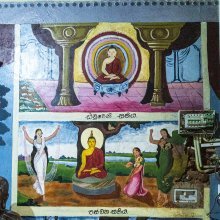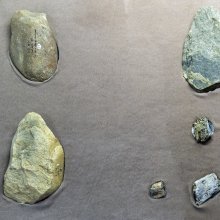Pasana, Pāṣāṇa, Pāsāṇa, Pashana: 20 definitions
Introduction:
Pasana means something in Buddhism, Pali, Hinduism, Sanskrit, the history of ancient India, Marathi, Jainism, Prakrit, Hindi. If you want to know the exact meaning, history, etymology or English translation of this term then check out the descriptions on this page. Add your comment or reference to a book if you want to contribute to this summary article.
The Sanskrit term Pāṣāṇa can be transliterated into English as Pasana or Pashana, using the IAST transliteration scheme (?).
Alternative spellings of this word include Pashan.
Images (photo gallery)
In Hinduism
Ayurveda (science of life)
Nighantu (Synonyms and Characteristics of Drugs and technical terms)
Source: Wisdom Library: Raj NighantuPāṣāṇa (पाषाण) refers to “stones” according to the second chapter (dharaṇyādi-varga) of the 13th-century Raj Nighantu or Rājanighaṇṭu (an Ayurvedic encyclopedia). The Dharaṇyādi-varga covers the lands, soil, mountains [viz., Pāṣāṇa], jungles and vegetation’s relations between trees and plants and substances, with their various kinds.

Āyurveda (आयुर्वेद, ayurveda) is a branch of Indian science dealing with medicine, herbalism, taxology, anatomy, surgery, alchemy and related topics. Traditional practice of Āyurveda in ancient India dates back to at least the first millenium BC. Literature is commonly written in Sanskrit using various poetic metres.
Purana and Itihasa (epic history)
Source: archive.org: Shiva Purana - English TranslationPāṣāṇa (पाषाण) refers to “rock”, representing a type of material for construction of a Liṅga, according to the Śivapurāṇa 1.22 while explaining the importance of the partaking of the Naivedya of Śiva:—“[...] with regard to the following phallic images viz:—[...] liṅgas made of rock (Pāṣāṇa-liṅga) [...], the partaking of the Naivedya of Śiva is on a par with the rite of Cāndrāyaṇa. Even the slayer of a brahmin if he partakes of the remains of the food offered to the God quells all his sins immediately [...]”.

The Purana (पुराण, purāṇas) refers to Sanskrit literature preserving ancient India’s vast cultural history, including historical legends, religious ceremonies, various arts and sciences. The eighteen mahapuranas total over 400,000 shlokas (metrical couplets) and date to at least several centuries BCE.
In Buddhism
Mahayana (major branch of Buddhism)
Source: Wisdom Library: Maha Prajnaparamita SastraPāṣāṇa (पाषाण) refers to a “mineral”, according to the Kośavyākhyā.—Accordingly: “It is said that a man asked for admission into the monastic Order. The noble Śariputra looked for some root of good in him before producing the deliverance but, as he saw none, he refused him and did not allow him into the Order. The Buddha, however, found one and allowed him into the Order. [...] And the Buddha said: ‘I definitely see in him a very small seed of deliverance, like a speck of gold caught in the interstices of a mineral (dhātu-pāṣāṇa)’.”.

Mahayana (महायान, mahāyāna) is a major branch of Buddhism focusing on the path of a Bodhisattva (spiritual aspirants/ enlightened beings). Extant literature is vast and primarely composed in the Sanskrit language. There are many sūtras of which some of the earliest are the various Prajñāpāramitā sūtras.
India history and geography
Source: Cologne Digital Sanskrit Dictionaries: Indian Epigraphical GlossaryPāṣāṇa.—(IE 8-5; SITI), one of the eight kinds of enjoyment of landed property; rocky soil and its products; mineral pro- ducts; probably, stony and hilly land referring to the right of quarrying, etc. Note: pāṣāṇa is defined in the “Indian epigraphical glossary” as it can be found on ancient inscriptions commonly written in Sanskrit, Prakrit or Dravidian languages.

The history of India traces the identification of countries, villages, towns and other regions of India, as well as mythology, zoology, royal dynasties, rulers, tribes, local festivities and traditions and regional languages. Ancient India enjoyed religious freedom and encourages the path of Dharma, a concept common to Buddhism, Hinduism, and Jainism.
Languages of India and abroad
Pali-English dictionary
Source: BuddhaSasana: Concise Pali-English Dictionarypāsāṇa : (m.) a stone; rock.
Source: Sutta: The Pali Text Society's Pali-English DictionaryPāsāṇa, (Epic Sk. pāṣāṇa) a rock, stone A. I, 283; Sn. 447; J. I, 109, 199; V, 295; Vism. 28, 182, 183; VbhA. 64 (its size as cpd with pabbata); DhA. III, 151; DhsA. 389; VvA. 157; Sdhp. 328.—guḷa a ball of (soft) stone, used for washing (pumice stone?) A. II, 200 (sāla-laṭṭhiṃ ... taccheyya ... likheyya ... pāsāṇaguḷena dhopeyya ... nadiṃ patāreyya), cp. M. I, 233; and Vism. 28 “bhājane ṭhapitaṃ guḷapiṇḍaṃ viya pāsāṇaṃ. ” —cetiya a stone Caitya DhA. III, 253.—tala a natural plateau J. I, 207.—piṭṭhe at the back of a rock Vism. 116.—pokkharaṇī a natural tank Vism. 119.—phalaka a slab of stone J. IV, 328.—macchaka a kind of fish (stone-fish) J. IV, 70; VI, 450.—lekha writing on a stone Pug. 32.—sakkharā a little stone, fragment of rock S. II, 137; A. IV, 237.—sevāla stone Vallisneria J. V, 462.—vassa rain of stones SnA 224. (Page 456)

Pali is the language of the Tipiṭaka, which is the sacred canon of Theravāda Buddhism and contains much of the Buddha’s speech. Closeley related to Sanskrit, both languages are used interchangeably between religions.
Marathi-English dictionary
Source: DDSA: The Molesworth Marathi and English Dictionarypāṣāṇa (पाषाण).—m (S) A stone, a rock. Pr. pāṣāṇālā ghāma yēīla paṇa hyālā yēṇāra nāhīṃ Used of a very miserly or a very merciless person.
--- OR ---
pāṣāṇā (पाषाणा).—m A disease of the horse, spavin.
Source: DDSA: The Aryabhusan school dictionary, Marathi-Englishpāṣāṇa (पाषाण).—m A stone, a rock. Pr. pāṣāṇālā ghāma yēīla paṇa hyālā yēṇāra nāhīṃ Used of a very miserly or a very merciless person.
Marathi is an Indo-European language having over 70 million native speakers people in (predominantly) Maharashtra India. Marathi, like many other Indo-Aryan languages, evolved from early forms of Prakrit, which itself is a subset of Sanskrit, one of the most ancient languages of the world.
Sanskrit dictionary
Source: DDSA: The practical Sanskrit-English dictionaryPāṣāṇa (पाषाण).—[pinaṣṭi piṣ saṃcūrṇane ānac pṛṣo° Tv.] A stone.
-ṇī 1 A small stone used as a weight.
2) A spear.
Derivable forms: pāṣāṇaḥ (पाषाणः).
Source: Cologne Digital Sanskrit Dictionaries: Shabda-Sagara Sanskrit-English DictionaryPāśana (पाशन).—n.
(-naṃ) 1. A noose, a snare. 2. Fettering, entrapping. E. pāśi, aff. lyuṭ .
--- OR ---
Pāṣāṇa (पाषाण).—m.
(-ṇaḥ) A stone in general. f. (ṇī) A small stone used as a weight. E. piś to grind, (condiments upon,) ghañ aff. ānac added, and the deriv. irr.
Source: Cologne Digital Sanskrit Dictionaries: Benfey Sanskrit-English DictionaryPāśana (पाशन).—i. e. paś + ana (m. or n.), A noose, Mahābhārata 7, 5923.
--- OR ---
Pāṣāṇa (पाषाण).—m. A stone, [Yājñavalkya, (ed. Stenzler.)] 2, 298.
Source: Cologne Digital Sanskrit Dictionaries: Cappeller Sanskrit-English DictionaryPāṣāṇa (पाषाण).—[masculine] stone; maya, [feminine] ī made of stone.
Source: Cologne Digital Sanskrit Dictionaries: Monier-Williams Sanskrit-English DictionaryPāṣāṇa (पाषाण):—m. (ifc. f(ā). ; according to, [Uṇādi-sūtra ii, 90 [Scholiast or Commentator]] [from] √paṣ; cf. pāśī) a stone, [Brāhmaṇa; Mahābhārata] etc.
Source: Cologne Digital Sanskrit Dictionaries: Yates Sanskrit-English DictionaryPāṣāṇa (पाषाण):—(ṇaḥ) 1. m. A stone in general. f. (ṇī) A stone used as a weight.
Source: DDSA: Paia-sadda-mahannavo; a comprehensive Prakrit Hindi dictionary (S)Pāṣāṇa (पाषाण) in the Sanskrit language is related to the Prakrit words: Pahāṇa, Pāsāṇa, Pāhaṇa.
[Sanskrit to German]
Sanskrit, also spelled संस्कृतम् (saṃskṛtam), is an ancient language of India commonly seen as the grandmother of the Indo-European language family (even English!). Closely allied with Prakrit and Pali, Sanskrit is more exhaustive in both grammar and terms and has the most extensive collection of literature in the world, greatly surpassing its sister-languages Greek and Latin.
Hindi dictionary
Source: DDSA: A practical Hindi-English dictionary1) Pasānā (पसाना):—(v) to pour off the watery content of boiled rice; to pour off superfluous water.
2) Pāṣāṇa (पाषाण) [Also spelled pashan]:—(nm) stone; —[yuga] the stone age; ~[hṛdaya] hard-hearted, stone-hearted, cruel, merciless, ruthless; unfeeling; hence ~[hṛdayatā] (nf).
...
Prakrit-English dictionary
Source: DDSA: Paia-sadda-mahannavo; a comprehensive Prakrit Hindi dictionary1) Pāsaṇa (पासण) in the Prakrit language is related to the Sanskrit word: Darśana.
2) Pāsāṇa (पासाण) also relates to the Sanskrit word: Pāṣāṇa.
Prakrit is an ancient language closely associated with both Pali and Sanskrit. Jain literature is often composed in this language or sub-dialects, such as the Agamas and their commentaries which are written in Ardhamagadhi and Maharashtri Prakrit. The earliest extant texts can be dated to as early as the 4th century BCE although core portions might be older.
Kannada-English dictionary
Source: Alar: Kannada-English corpusPāśāṇa (ಪಾಶಾಣ):—[noun] = ಪಾಸಾಣ [pasana].
--- OR ---
Pāṣāṇa (ಪಾಷಾಣ):—
1) [noun] a piece of a rock; a stone.
2) [noun] any precious stone; any gem.
3) [noun] any poison (as the one used to kill pests).
--- OR ---
Pāsāṇa (ಪಾಸಾಣ):—
1) [noun] = ಪಾಷಾಣ - [pashana -] 1.
2) [noun] a hard mineral deposit sometimes formed in the kidney from phosphates, urates, etc.; renal calculus; kidney stone.
Kannada is a Dravidian language (as opposed to the Indo-European language family) mainly spoken in the southwestern region of India.
See also (Relevant definitions)
Starts with (+49): Pacanacam, Pacanakkal, Pacanankam, Pacanapeti, Pasana Sutta, Pasana upalabheda, Pasanabehda, Pasanabhedah, Pasanacceti, Pasanacetiya, Pasanachataka, Pasanadipa, Pasanagairika, Pasanagamavapi, Pasanagula, Pasanahavadiya, Pasanaka, Pasanakacetiya, Pasanalekha, Pasanalekha Sutta.
Ends with (+75): Abhayebalakapasana, Acaryopasana, Acaryyopasana, Acharyopasana, Acharyyopasana, Adhaupasana, Adhopasana, Akhupashana, Ambapasana, Amdhapashana, Anupasana, Apasana, Atmopasana, Aupasana, Avupasana, Balapasana, Brahmopasana, Chidrapashana, Dakapasana, Dakshinamurtyupasana.
Full-text (+178): Kashapashana, Pashanadaraka, Pashanadarana, Gandhapashana, Akhupashana, Pashanabhedin, Pashanahridaya, Ancanapashanam, Kutirai-parpashanam, Dugdhapashana, Nikashapashana, Vaippuppashanam, Pashanabhedarasa, Pashana bheda, Pashanabhedaka, Pashanabheda, Pashi, Pashanataranam, Pasanaka, Pashanavajrakarasa.
Relevant text
Search found 25 books and stories containing Pasana, Pāṣāṇa, Pāsāṇa, Pashana, Pāṣāṇā, Pāśana, Pasānā, Pāsaṇa, Pāśāṇa; (plurals include: Pasanas, Pāṣāṇas, Pāsāṇas, Pashanas, Pāṣāṇās, Pāśanas, Pasānās, Pāsaṇas, Pāśāṇas). You can also click to the full overview containing English textual excerpts. Below are direct links for the most relevant articles:
Garga Samhita (English) (by Danavir Goswami)
Verse 3.10.3 < [Chapter 10 - The Glory of Śrī Girirāja]
Verse 6.10.20 < [Chapter 10 - In the Description of the Gomatī River, the Glories of Cakra-tīrtha]
Verse 6.10.12 < [Chapter 10 - In the Description of the Gomatī River, the Glories of Cakra-tīrtha]
The Skanda Purana (by G. V. Tagare)
Chapter 51 - Pilgrimage to Setu < [Section 1 - Setu-māhātmya]
Rasa Jala Nidhi, vol 4: Iatrochemistry (by Bhudeb Mookerjee)
Treatment for fever (102): Sannipata-sudana rasa < [Chapter II - Fever (jvara)]
Treatment for fever (105): Kalanala rasa < [Chapter II - Fever (jvara)]
Part 36 - Treatment for indigestion (34): Vadavanani rasa < [Chapter IV - Irregularity of the digesting heat]
Rasa Jala Nidhi, vol 2: Minerals (uparasa) (by Bhudeb Mookerjee)
Part 1 - Characteristics of Gairaka (red ochre) < [Chapter IX - Uparasa (10): Gairika (red ochre)]
Part 6 - Incineration of the essence of tuttha and that of sasyaka < [Chapter V - Uparasa (5-6): Tuttha and Sasyaka (copper sulphate)]
Part 2 - Purification of Makshika < [Chapter II - Uparasa (2): Makshika (pyrites)]
Rasa Jala Nidhi, vol 3: Metals, Gems and other substances (by Bhudeb Mookerjee)
Part 6 - Extraction of oil from seeds of Pashana < [Chapter XXXII - Extraction of oil from seeds]
Part 3 - Incineration of copper < [Chapter III - Metals (3): Tamra (copper)]
Part 24 - Usage of poisons < [Chapter XXX - Visha (poisons)]
Dipavamsa (study) (by Sibani Barman)
Related products



